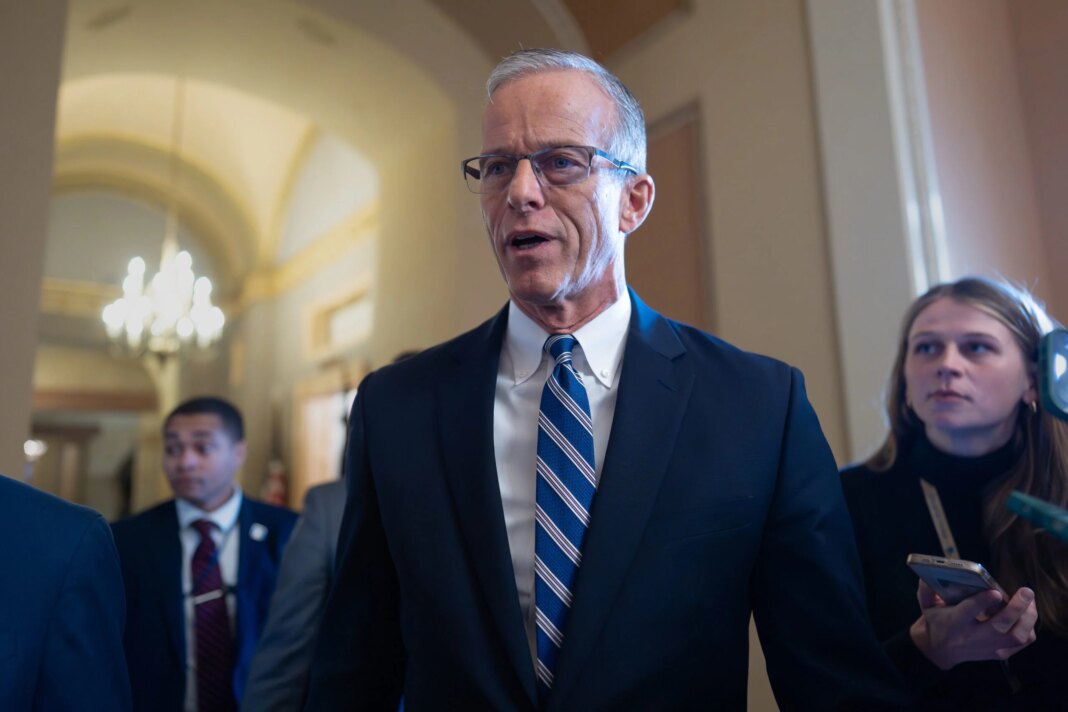The Ongoing Government Shutdown: A 40-Day Standstill
As the sun rose on a recent Sunday, the United States entered the 40th day of a government shutdown, a situation that has thrown numerous facets of daily life into turmoil. Flights across the nation have been disrupted, food assistance programs teeter on the edge of collapse, and countless federal employees face the stark reality of missed paychecks. With uncertainty swirling, senators convened over the weekend, striving to bridge the stalemate that has gripped the nation.
The Senate’s Week-Long Struggle
Despite the urgency, progress in the Senate has been painfully slow. Republican leaders are eyeing a series of votes aimed at reopening the government through to January, while simultaneously pushing for full-year funding across various sectors. However, there’s a snag—the necessary support from Democrats to make this happen remains elusive. Senate Majority Leader John Thune from South Dakota expressed optimism, stating, “We’re only a handful of votes away” from a potential legislative breakthrough.
Health Care Subsidies Take Center Stage
At the heart of the negotiations lies a contentious debate over health care subsidies linked to the Affordable Care Act. Democratic leaders are adamant about extending these subsidies, which provide much-needed relief to those enrolled in health plans. Meanwhile, Republicans have faced backlash for their rejection of this proposal and are instead exploring options put forth by a faction of moderate Democrats. This group has suggested a temporary agreement to end the shutdown in exchange for a later vote on extending health care subsidies.
The stakes are high; if Congress allows existing subsidies to expire, premiums could skyrocket, effectively doubling for many households next year. Independent Senator Bernie Sanders, who aligns with the Democratic party, cautioned that any promises regarding future votes on health care would amount to “wasteful gestures” without strong commitments from House leadership and the presidency.
Trump’s Public Pressure
In the midst of deliberations, former President Donald Trump has urged the Republican Party to scrap the Senate’s filibuster rules, which necessitate bipartisan support for most legislation. He calls for a more aggressive approach to ending the shutdown and believes that abandoning the filibuster could help Republicans push through legislation without Democratic input. “Be the Smart Party,” Trump insisted in a recent social media post, adding to the growing tension within GOP ranks.
Negotiations Among Moderates
Amidst the chaos, a small group of Senators, including Jeanne Shaheen of New Hampshire, have been working on bipartisan proposals aimed at securing funding for essential services like food aid and veterans’ programs. Their plan, however, hinges on the promise of future health care votes, a detail that remains contentious. The uncertainty surrounding sufficient Democratic backing for the plan complicates matters, as do hints from key Republican figures about their reluctance to commit to extending health benefits.
Republican Plans Unfold
The landscape shifts as Trump continues to push for rapid solutions. Vice President JD Vance echoed Trump’s sentiments, suggesting that moderate Republicans who support maintaining the filibuster might be edging towards the wrong side of history. Yet not all Republicans agree; some, like Senator James Lankford, assert that the filibuster promotes necessary dialogue between the parties and is crucial for a healthy legislative process.
Amidst these discussions, Senate leaders like Thune are contemplating a new bipartisan package reflecting the proposals developed by moderate Democrats. This potential legislation could replace previous bills rejected multiple times by Democrats, with the current proposal extending government funding until November 21—a timeframe that seems much too short given the enormity of issues at stake.
A Crucial Decision Ahead
In the coming days, the Senate may face a test vote on new legislation, presenting Democrats with a critical choice. They can either press on for a substantial deal that ensures health care subsidies remain intact during the winter months, thus prolonging the shutdown, or they can gamble on reopening the government with promises of future votes—albeit without guarantees of success.
Senate Democrat leader Chuck Schumer has been vocal about the risks of inaction, arguing that failing to extend subsidies could have dire consequences for many Americans. “Doing nothing is derelict because people will go bankrupt, people will lose insurance, people will get sicker,” he warned, emphasizing the importance of swift congressional action.
As negotiations continue, the future remains uncertain, but one thing is clear: the consequences of this impasse are already being felt across the nation, and the pressure is mounting for all parties involved to find a resolution.



